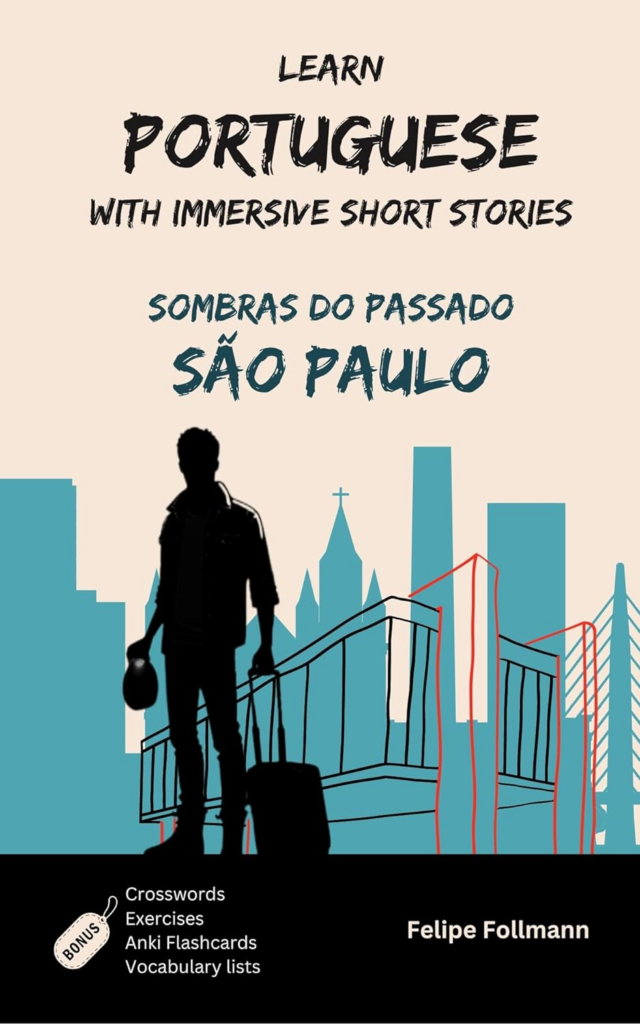In my recent exploration of tools for mastering Brazilian Portuguese (link here), I introduced you to a specially designed Anki flashcard deck complementing my graded book:

„Learn Portuguese with Immersive Short Stories: Sombras do Passado – São Paulo.“, which is available at Amazon, for Kindle, via Kindle unlimited, and as printed version: paperback and hardcover!
Link to the graded book: Amazon.com: Learn Portuguese with Immersive Short Stories: Sombras do Passado – São Paulo
Look for it in the Amazon website from your country!
While Anki offers a robust platform for spaced repetition learning, I’ve discovered another resource that provides a paid, more user-friendly alternative:

Lingvist: A User-Friendly Companion for Language Learners
Lingvist (https://lingvist.com/) stands out as a streamlined and intuitive platform for language acquisition. Unlike my deck in Anki, where the sentences for flashcards are directly extracted from „Sombras do Passado – São Paulo,“ Lingvist sets its own sentences. This difference offers learners a broader context for word usage, presenting vocabulary in various sentences beyond those found in the book.
Seeing words in different contexts can be particularly beneficial for intermediate learners, who might already be familiar with the basics and are looking to expand their understanding and usage of the language.
The Unique Approach of Lingvist

Lingvist focuses on efficiency and engagement. The platform dynamically adapts to your learning pace, ensuring that you’re always challenged just enough to keep progressing without feeling overwhelmed. Its curated sentences provide rich, diverse contexts for learning new words and phrases, catering to the practical needs of language learners.

Why Lingvist Complements Anki
While Anki allows for deep customization and the ability to use sentences from our book, thus ensuring consistency with the material you’re studying, Lingvist offers a complementary approach. Seeing words in different contexts can be particularly beneficial for intermediate learners, who might already be familiar with the basics and are looking to expand their understanding and usage of the language.
Choosing Between Anki and Lingvist
Both platforms have their merits.
Anki, with its algorithmic approach to spaced repetition, is excellent for those who enjoy customization or are beginners and will benefit from repeating and listening entire sentences from the book with flashcards.
On the other hand, Lingvist’s user-friendly interface can keep you motivated to come back and practice the vocabulary. Its provision of diverse sentence contexts make it an appealing option for intermediate and advanced learners seeking variety of sentences where the vocabulary is used and ease of use.
My deck for Anki also has audio, and I consider the quality higher than from Lingvist. Lingvist will read the cards for you on the fly, if you set it on – it is on by default.
Final Thoughts
Language learning is a deeply personal journey, and the tools you choose should reflect your preferences, goals, and the stages of your learning process. Whether through Anki or Lingvist, the key is to immerse yourself in the language, embrace the culture, and enjoy the journey.
I personally started learning German with Anki. I had different sets of flashcards that I extracted from learning material and books. Nowadays, as I am an advanced learner of German, I’m still extracting words from material and books I read, but I use Lingvist to practice the words and keep some contact with the difficult ones.
Whatever is the tool I would use at a certain moment of my learning journey… what I can say is that flashcards were and still are essential for me. In the beginning, I spend more time with flashcards. Something like 15 to 40 minutes depending on the day, but every day. Nowadays, as an advanced learner, it’s more important for me to have contact with the language and practice in different ways other than with flashcards. However, I still try to do 50 Lingivist cards per day – I take 15 minutes for that. In some days, I only do 5 minutes, i.e., not all 50 cards, and that’s ok for me.
Explore both platforms and see which one resonates more with your learning style. Remember, the best tool is the one that keeps you engaged and consistently moving forward in your language learning journey.
Happy learning, and may your exploration of Portuguese continue to be a source of joy and discovery.
Warm regards,
Dr. Felipe Follmann
